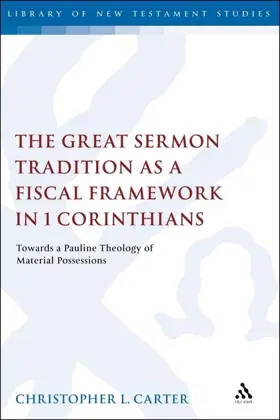

The Great Sermon Tradition as a Fiscal Framework in 1 Corinthians: Towards a Pauline Theology of Material Possessions
in Library of New Testament Studies
Pages
288
Publisher
T&T Clark
Published
2/3/2010
ISBN-13
9780567473042
This text addresses two separate but related questions. Firstly, what is Paul's theology of material possessions, and secondly, what is the source of the apostle's thought on this subject? Carter endeavours to answer these questions by posing the hypothesis that Paul owes his pecuniary thought to the synoptic sermon tradition. Unlike other studies that investigate this link, Carter does not appeal to verbal parallels to establish this theory. Rather, he demonstrates a continuity in the broad fiscal thought of Jesus and Paul. This is accomplished by first demonstrating the plausibility of Paul's acquaintance with the dominical tradition through evidence related to the apostle's historical environment and his extant writings.
The author then establishes the likelihood that Paul knew the pre-synoptic sermon tradition because of its ubiquity in early church discipleship, the judgment of form critical scholars, and its pervasive resonances in Pauline literature. From this point of embarkation, Carter moves on to articulate the broad fiscal thought of the synoptic sermons. It is found that the synoptic sermons' fiscal material has a pervasively eschatological orientation, and that in the sermons, Jesus seeks to redefine the financial worldview of Christian disciples.
Having examined the synoptic sermons, their fiscal thought is compared with that expressed by Paul in 1 Corinthians. Through the course of this comparison, alternate sources in Jewish and Hellenistic literature are considered as potential explanations for any correspondences. Ultimately, the study concludes that Jesus' and Paul's financial thought evidence remarkable symmetry that cannot be explained by a shared cultural environment. Consequently, it is determined that Paul very likely depends on the dominical tradition for the contours of his financial thought.
- Table of contents
- Contents
- Acknowledgments
- Abbreviations
- Chapter 1 - Introduction
- 1 The Paul/Jesus Debate
- 2 Paul's Attitude towards Material Possessions
- 3 Objectives and Method
- Chapter 2 - The Authenticity of The Great Sermon Tradition
- 1 Ethics and Authenticity
- 2 Orality and Authenticity
- 3 Text and Authenticity
- 4 Conclusion
- Chapter 3 - Paul's General Interest in The Historical Jesus and His Specific Knowledge of The Great Sermon Tradition
- 1 Inconclusive Indifference
- 2 Inconclusive Texts
- 3 Suggestive Circumstances
- 4 Suggestive Texts
- 5 Discipleship, Ethics, and The Great Sermon Tradition
- 6 Conclusion
- Chapter 4 - The Fiscal Worldview of the Great Sermons
- 1 Eschatology as a Hermeneutical Framework
- 2 An Otherworldly Perspective
- 3 The Ethical Implications of an Otherworldly Perspective
- 4 The Relational Priority of an Otherworldly Perspective
- 5 Impending Judgment
- 6 Conclusion
- Chapter 5 - 1 Corinthians vis á vis the Great Sermon Tradition
- 1 Introductory Considerations
- 2 Eschatology as a hermeneutical framework
- 3 An otherworldly perspective
- 4 The Ethical Implications of an Otherworldly Perspective
- 5 The relational priority of an otherworldly perspective
- 6 Impending Judgment
- 7 Conclusion
- Chapter 6 - Paul and Jesus vis á vis Jewish and Greco-Roman Fiscal Thought
- 1 Fiscal Thought in Biblical Judaism
- 2 Fiscal Thought in Second Temple Judaism(s)
- 3 Fiscal Thought in the Greco-Roman World
- 4 Conclusions
- 5 Summary
- Chapter 7 - Conclusions and Further Refection
- 1 Paul's Theology of Material Possessions
- 2 The Source of Paul's Fiscal Thought
- 3 Further Reflection
- Works Cited